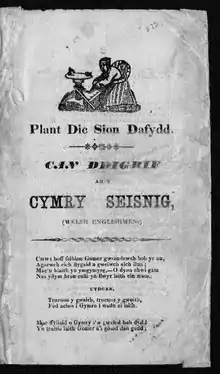Dic Siôn Dafydd
Dic Siôn Dafydd ([dɪk ʃoːn ˈdavɨ̞ð], "Dick [son of] John [son of] David") is a satirical stereotype of an Anglophile Welsh person who deliberately turns their back on the Welsh people, their culture and the Welsh language. A Dic Siôn Dafydd instead embraces the concept of Englishness, English culture and the English language. It is traditionally used as an insult.

History and symbolism
Jac Glan-y-gors created a satirical portrait of 'Dic Siôn Dafydd' as a stereotypical Welshman who has consciously decided to forget his roots and turn his back on his nation, culture and language, influenced by a will to succeed in England.[1] The 18th-century ballad describes Dic Siôn Dafydd as a pompous character that has grown up speaking Welsh but insists on speaking English even to his own Welsh-speaking mother.[2]
Dic Siôn Dafydd is also known to be used as a term for abuse or as an insult that has political connotations. It refers to someone from Wales who betrays their nation for their own financial or political gain, or simply having turned their back on their country. More recently it has been used as an insult for Welsh people who become part of the upper levels of the British establishment but forget their Welsh roots.[2] The character has been described as a Welsh person speaking only English, who is an anglophile and/or anglicised, self-loathing of Wales or its identity, refuses to speak Welsh, or simply a "traitor".[3][4]
Ballad
First and last verses of the ballad, on the left in 18th century Welsh and on the right an English translation.
Gwrandewch ar hanes Dic Siôn Dafydd, |
Listen to the history of Dic Siôn Dafydd |
Inclusion in other works
The name is also mentioned in the folk song, Yma o Hyd,
"Er gwaetha pob Dic Siôn Dafydd, |
Despite every Dic Siôn Dafydd, |
There have been other poems written by other Welsh poets in the style of the Dic Siôn Dafydd ballad, including by Talhaiarn, published in 1862 under the title "Dammeg Dic Siôn Dafydd yr Ail" (The Parable of Dic Siôn Dafydd the Second).[7]
During the revival of the Eisteddfod tradition, a poets' competition at the 1824 National Eisteddfod at Powys, where satirical poems in the traditional englyn form were submitted under the pre-announced title "Beddargraff Dic Siôn Dafydd" (The Epitaph of Dic Siôn Dafydd).[8]
See also
References
- "'Dic Sion Dafydd' - Welsh ballad by Jac Glan-y-gors, page 1". Peoples Collection Wales. Retrieved 2022-11-18.
- "The top 12 most satisfying Welsh language insults to aim at your worst enemy – or your mates". Nation.Cymru. 2022-04-28. Retrieved 2022-11-18.
- Singer, Rita (January 2015). Margrave, Christie (ed.). "Liberating Britain from Foreign Bondage: A Welsh Revision of the Wars of the Roses in L. M. Spooner's Gladys of Harlech; or, The Sacrifice (1858)". Rule Britannia?: Britain and Britishness, 1707-1901 (Pp.143-158). Cambridge Scholars Publishing.
one of the most derided figures in Welsh literature of the nineteenth century is Dic Siôn Dafydd, a Welshman who claims to have forgotten his language and national identity since living in London and so becomes a traitor to his cultural heritage.
- Jenkins, Bethan (1 March 2017). Between Wales and England: Anglophone Welsh Writing of the Eighteenth Century. University of Wales Press. p. 7.
Dic Siôn Dafydd, the Anglophile, anglicised, self-loathing Welshman, has become a proverbial character in Welsh culture, reinforcing the linguistic difference and animosity between English and Welsh cultures, and above all their separateness; it is no coincidence that this character emerged in the eighteenth century, brought to life in the eponymous poem by the radical London Welshman John Jones (Jac Glan-y-Gors; 1766–1821).
- "'Dic Sion Dafydd' - Welsh ballad by Jac Glan-y-gors, page 1".
- Coleman, Tom (2022-03-29). "Yma o Hyd full lyrics, meaning and why Wales football fans started singing it". WalesOnline. Retrieved 2022-11-18.
- Jones, John (1862). Gwaith Talhaiarn: The works of Talhaiarn, in Welsh and English.
- Eisteddfod, 1824 (WELSHPOOL), Powys (1826). Powysion: sef. Awdlau, cywyddau, ac ynglynion, a ddanfonwyd i Eisteddfod Trallwng, Medi, 1824. Llyfr II. [Edited by Walter Davies.] (in Welsh). R. Sanderson.